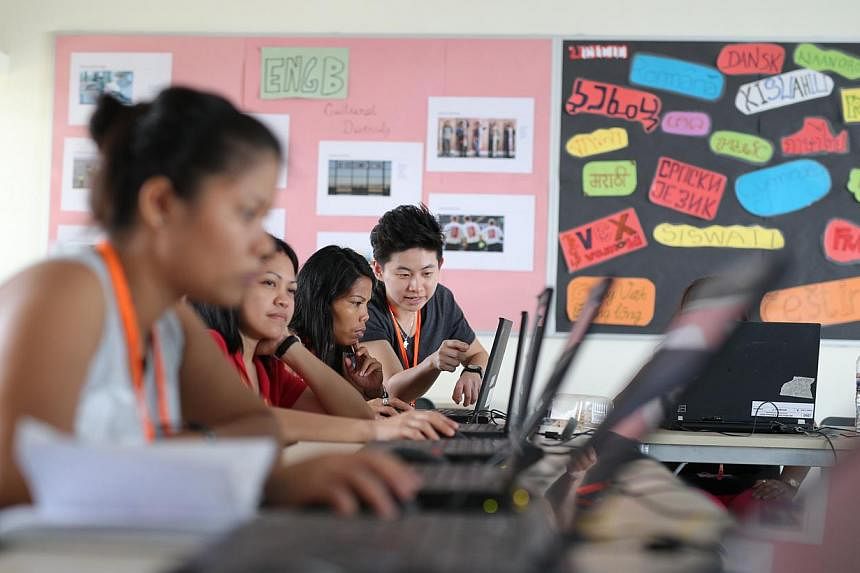Every Sunday, United World College, an international school for expatriate children in Singapore, opens its doors to a different type of foreign student: domestic workers who are on a quest to change their lives.

The women, most of whom hail from South-east Asian countries such as the Philippines, Indonesia and Myanmar, are learning how to set up small businesses such as cafes and retail shops.
If they succeed, the money that they make from their business ventures will help to supplement their pay of $500, which they earn each month for cooking and cleaning for Singaporean families.
The classes are run by Aidha, a non-governmental organisation that is the only one in Singapore that specialises in teaching maids how to manage their money and start businesses.
Other non-profit and religious organisations in the city-state conduct courses that teach English and skills such as cooking and caregiving.
Set up in 2006, Aidha takes its name from a Sanskrit word that means "that to which we aspire".
"It is a fitting name as it is our mission to inspire domestic workers to achieve their dreams despite the difficulties they face," says the group's chief executive, Ms Karen Fernandez.
Poverty and hardship are common threads in the stories of most of the 218,300 domestic workers in Singapore.
Many are young women in their early 20s and sole breadwinners of their families who incur heavy debts to pay recruitment agents to secure jobs for them here. These recruitment fees can go up to about US$3,200 (S$4,000) or so, which means many maids go without salaries for up to a year.
After clearing their debts, these maids faithfully wire their earnings to their families back home every month, and thus end up with little savings despite having worked in Singapore for years.
Moved by their difficulties, social activist Melissa Kwee and writer Audrey Chin started thinking about ways to help domestic workers break out of their poverty cycle.
In 2001, they came up with the idea of developing a financial literacy programme for these workers.
They engaged non-profit organisation UN Women Singapore to run the programme, which continued until 2005, when it stopped due to a reorganisation of the group.
But some members of UN Women Singapore were determined to continue the financial literacy programme, and decided to set up Aidha in 2006.
Since then, Aidha has trained more than 2,600 domestic workers.
At the Sunday classes run by a pool of about 200 volunteers, the maids learn computer and communication skills, how to manage their money, and how to start and manage their own businesses.
It costs the workers $550 to attend both courses, but most of them get help from their employers to pay part of the fees.
Around half of the domestic workers Aidha has trained have gone on to start or invest in their own businesses.
"They start small but slowly the businesses can be alternative sources of income," says Ms Fernandez. "This allows the women to have the choice to stop working as a domestic worker in the future."
Domestic workers who have attended the courses say one of the most valuable skills they pick up is learning how to reject demands from relatives for more money.
Says Ms Gladys Dizon, 47, who is from the Philippines: "I felt guilty for not being with my children. I would keep sending money so that they could buy whatever they want. But I have learnt that I must save for my future too."
Aidha's next challenge is to convince the domestic workers' employers of the significance of its success, so that more will send their maids for training.
Many employers, says Ms Fernandez, are worried that their maids will stop working after starting their own businesses.
"My reply to them is to think about whether they would want their mother, sister or wife to live the life of a domestic worker," she says.
"They should give these women a chance to carve a brighter future for themselves."
Domestic helpers, too, say they hope that more bosses will support their dreams.
Some have been so inspired by Aidha's courses that they return to UWC to help out.
Indonesian helper Dewi Lestari, 27, who goes there every Sunday after graduating two years ago, says: "I come here and meet my friends and give advice to other domestic workers who want to start their own businesses. It is a better way to spend time than going to shopping malls."

